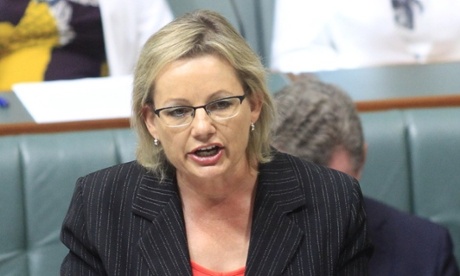
Australian health insurance premiums will rise by an average of more than 6% on 1 April.
The health minister, Sussan Ley, announced on Friday that she had approved the proposed increases, but said the scale varied between health insurers and people should “shop around to get the best deal”.
Ley said the 6.18% average weighted increase across the industry followed a 7.4% rise in total benefits paid to health insurance members in the 12 months to December.
But Labor denounced the decision as “another slap in the face for families”, saying the Coalition had waved through the second-highest increase in private health insurance premiums in a decade.
Medibank Private – which was previously government owned but was floated on the stock market late last year – will increase premiums by 6.59%. Recent increases to Medibank premiums were 6.49% in 2014, 6.2% in 2013, and 4.7% in 2012.
Ley said the government had to ensure that any premium increases struck “the right balance between keeping them affordable for consumers without putting the financial viability of the sector at risk”.
“Over 13 million Australians now have some form of private health insurance and it’s therefore essential for the health of our nation that we continue to maintain a strong and competitive market,” Ley said in a statement.
“With over 30 private health funds now operating in the Australian market, my strong advice to consumers is shop around to get the best deal if you are unhappy with your health fund’s offering.”
The minister’s media release highlighted that some health funds were set to offer below-average premium increases as low as 3.98% and encouraged people to check out the competition using the government’s independent comparison website www.privatehealth.com.au.
A starred note at the bottom of the release included a link to the full list of premium increases for individual health funds.
It is true that the lowest increase is 3.98%, but this was for the Doctors Health Fund – a restricted fund that is open only to registered health and medical practitioners and relatives.
The list indicated the highest increase was 7.92% for Westfund.
Private health insurers are required by law to apply to the health minister for approval of premium changes, which routinely take effect from 1 April. The Private Health Insurance Act says these proposals must be approved “unless the minister is satisfied that a change that would increase the amount or amounts would be contrary to the public interest”.
The opposition’s health spokeswoman, Catherine King, said the previous Labor government – which approved a 6.02% increase in 2009 – had “put pressure on the health insurance sector to ensure the lowest possible premium rises”.
“The two rises approved since the 2013 election are the two highest increases since the Coalition was last in power, when then health minister Tony Abbott ticked off three successive rises exceeding 7%.”
Abbott said in January that the government expected health funds to “do their best by their members but in the end this is a commercial decision”.
“It is up to the market to set the price,” the prime minister said. “The premiums that people pay is a matter between the fund members and the funds.”
The 6.18% average increase across the industry compares with the 6.2% increase approved by the then health minister Peter Dutton in 2014. Labor approved average increases of 5.6% in 2013, 5.06% in 2012, 5.56% in 2011, 5.78% in 2010.
